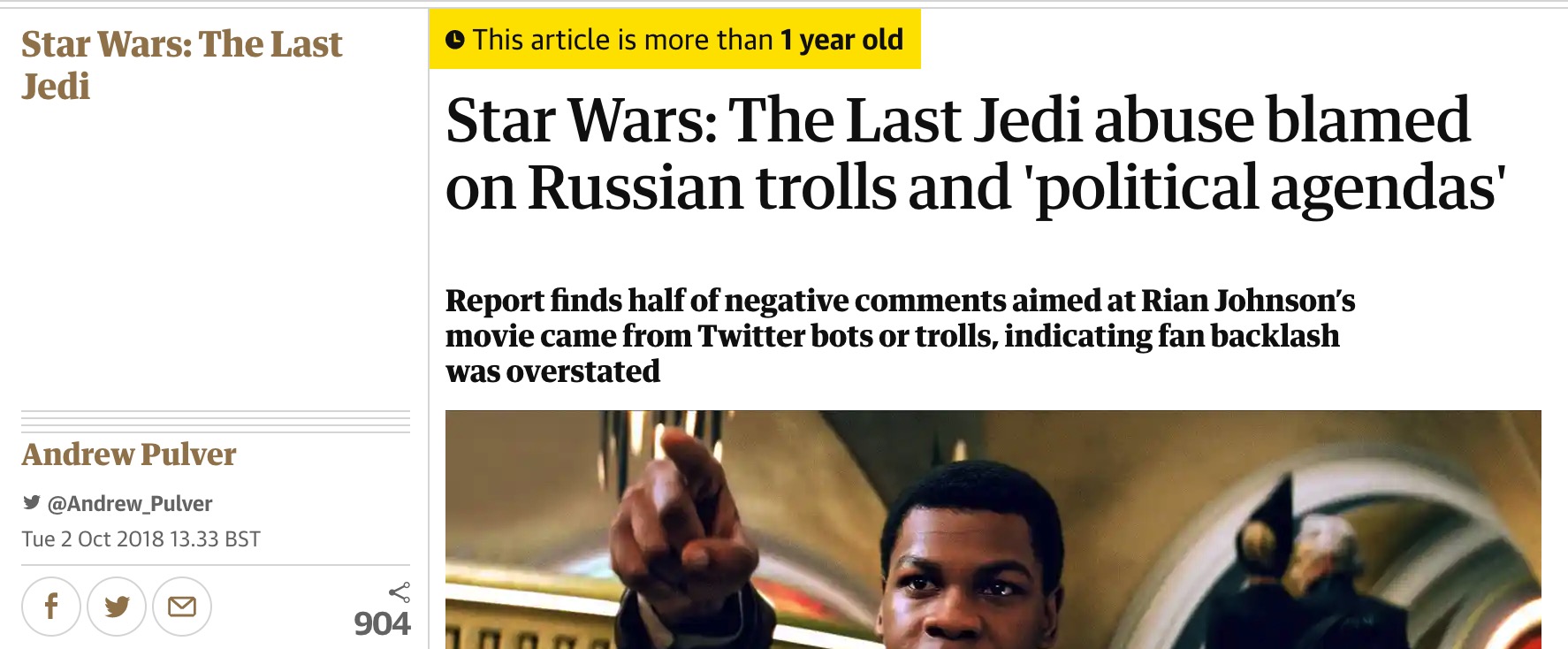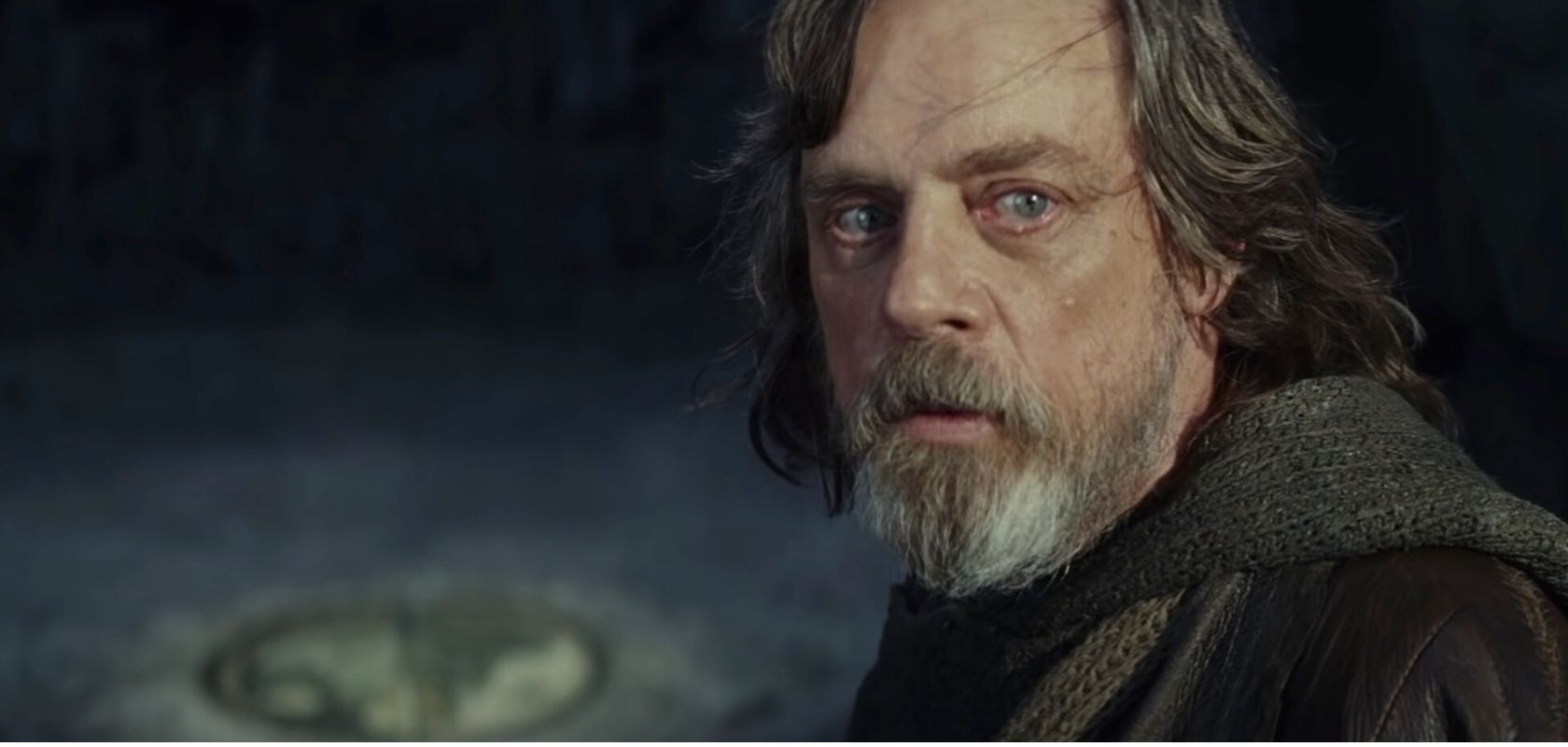Last year in October 2018, Morten Bay of UCLA published a paper about tweets bashing the controversial Star Wars movie The Last Jedi and had determined that “50.9 percent of negative tweets about the movie were politically motivated and not even human.”
Some moviegoers who had traditionally been Star Wars fans considered that statement to be absurd, and an attempt to downplay the genuine widespread criticism of the movie. But that didn’t stop major publications like CTV, Wired, The Verge, and even Forbes to run with the story that it was Russian bots were behind the backlash against the movie.

Bay observed the accounts that tweeted negatively about the film, and found that many of them used keywords like “Trump” and other “hate speech”, which lead him to the conclusion that they were similar to the “bot” accounts allegedly used by Russia to influence the US 2016 election by weaponizing people to “further propagate a narrative of widespread discord and dysfunction in American society.” He believed the anti-Star Wars tweets served the same purpose, to portray a false image of how polarized America is.
Since then, a myriad of articles have come out debunking the suggestion that over 50% of the negative comments were bots. It turns out it was around 10% of those that were analyzed that could be considered bots – and the only tweets analyzed were those that were specifically tweeted directly to Rian Johnson, the movie’s director.
Jackson Ryan of CNET was one of those to debunk the claims:
“Bay’s paper stated that “50.9% of those tweeting negatively” about The Last Jedi were likely to be politically motivated or not even human. This was the major takeaway for a panoply of media outlets that then stated most of the negative sentiment directed at The Last Jedi came from Russian trolls.
But that is not the truth — or at least, it distorts the truth.
Bay collected 1,273 tweets using Twitter’s Advanced Search function, all of which were tweeted to Rian Johnson’s account (@rianjohnson) over a seven-month period, post-release.
After “cleaning” the dataset, Bay finished with 967 tweets. He then “manually” determined whether a tweet was negative, positive or neutral. Ultimately, deciding the sentiment of any particular tweet was left up to Bay. To separate the negative tweets out even more, Bay would search the accounts with high activity for terms such as “Trump” or “SJW” to determine their political stance.
Of the 967 tweets analyzed, 206 expressed “a negative sentiment” toward the film and its director.
Of the 206 negative comments, 61 were real people reported to have a political agenda, 11 were bots and only 33 appeared to be trolls. Of those 33, just 16 appeared to possess characteristics consistent with Russian troll accounts. In reality, less than one in 10 tweets were from Russian trolls — nowhere near the 50 percent being widely reported.”
The matter was considered to be settled by those paying attention, especially after Bay walked back the original claims and said that actually only 16 accounts of the 967 were suspected Russian bots.
That was until an opinion piece by Annalee Newitz was published this week in The New York Times. Newitz reiterated the same original misleading points from the paper, attributing the hate essentially to “political activists and trolls” that are upset by the “politically correct” moves made by Disney to incorporate more women and people of color in the protagonist roles in movies.
The article says “that over 50 percent of the venom directed on Twitter at Rian Johnson, director of “The Last Jedi,” came from the same sources as Russian election meddling,” – something that has been proved wrong.
Political and historical podcaster Mike Duncan fired off a tweet chain about the NYTimes story with comments like “Feels like social media platforms need to a) more aggressively combat troll farms or b) we all just need to log off.” He acknowledged the falsehood of the 50% figure quoted from the study, “But that doesn’t mean accounts like that don’t glom onto every social cleavage to stir up more vitriol.”
https://twitter.com/mikeduncan/status/1210120670136459264
As a seeming case study of how misleading information spreads and evolves, the idea of Russian bots providing the backlash to The Last Jedi was then reiterated by congressional candidate Brianna Wu.
Click here to display content from X.
Learn more in X’s privacy policy.
On Twitter, Wu then took the segment from The Times that said, “over 50 percent of the venom directed on Twitter at Rian Johnson, director of ‘The Last Jedi,’ came from the same sources as Russian election meddling,” and extrapolated it out to suggest over 50% of the entire online backlash was caused by Russian bots, saying “over half the online anger directed at #LastJedi came from Russian sock puppet accounts.”













